- 24/7 Free Consultation: (888) 424-5757 Tap Here To Call Us
Can You Sue Lyft for an Accident in Chicago?

So, can you sue Lyft for an accident? The short answer: it’s possible in very limited situations, but often suing Lyft directly isn’t necessary. That’s because Lyft’s insurance coverage—combined with the driver’s personal auto insurance—can provide compensation for your injuries and losses.
Rideshare services like Lyft have become a fixture in Chicago life—whether you’re heading home from O’Hare, meeting friends in Wicker Park, or commuting downtown during rush hour. But when a Lyft accident happens, figuring out who’s responsible—and whether you can take legal action—can be confusing.
In this guide, we’ll explain how claims for accidents involving Lyft vehicles work, when Lyft can be held liable, what insurance applies based on the driver’s status, and how an experienced Lyft accident attorney in Chicago can help you recover fair compensation.
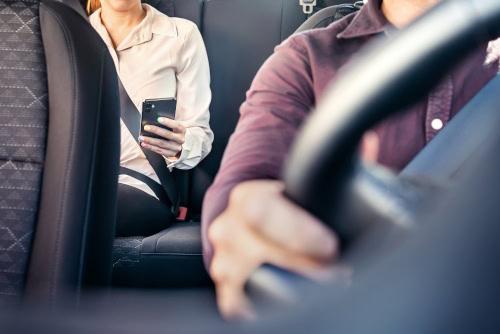
Determining Liability: Who Caused the Rideshare Accident?
The first step in any rideshare accident case is determining liability—in other words, identifying who caused the car accident and which party (or parties) should be held legally and financially responsible. Because multiple vehicles and parties are often involved, this process can be more complex than in a typical car accident.
There are a few common scenarios:
- The Lyft driver was at fault: If the rideshare driver was speeding, texting, running a red light, or otherwise driving negligently of traffic laws, they may be liable for the crash. In these cases, your Lyft accident claim would likely go through the company’s insurance policy, depending on the driver’s status at the time.
- Other drivers were negligent: If a separate vehicle caused the collision, such as a driver who changed lanes illegally, failed to yield, or engaged in other dangerous driving behaviors, then your insurance claim may be filed against that at-fault driver’s policy. This is common when the Lyft vehicle is struck by someone else.
- Lyft itself may be liable: While rare, Lyft can be held directly accountable in limited situations, such as when the company negligently hired or retained a driver with a known history of dangerous behavior. These cases require a high level of proof and are covered in more detail below.
Lyft Drivers: Independent Contractors, Not Employees
One major reason why suing Lyft after an accident is so difficult is that their drivers are classified as independent contractors, not employees. This is a legal distinction that affects how liability is assigned.
Under Illinois law, companies generally aren’t responsible for the actions of independent contractors the way they would be for employees. This means Lyft can often avoid vicarious liability for accidents caused by its drivers while they’re performing rideshare services.
This doesn’t mean you’re out of options—it just means the claim usually goes through Lyft’s insurance or the driver’s personal insurance rather than through a direct lawsuit against the company itself.
When Would Lyft Be Directly Liable?
While Lyft usually can’t be sued for a driver’s negligence, there are exceptions. For example, if Lyft failed to conduct proper background checks (negligent hiring) or kept a driver on the road despite multiple complaints or a dangerous driving history (negligent supervision), they may be directly liable.
Proving this kind of claim is extremely difficult and requires extensive investigation—something an experienced rideshare accident attorney can help with. It often involves subpoenas for internal records or prior safety complaints, which can be hard to access without legal representation.
Understanding Lyft’s Insurance Structure
Instead of facing lawsuits directly, Lyft provides a multi-tiered insurance policy to cover drivers and passengers depending on the driver’s activity at the time of the crash. Lyft’s insurance policy is what generally pays for injuries and property damage after an accident.
Lyft’s insurance system is intentionally structured to minimize the company’s direct liability while still meeting state requirements, including those set by the Illinois Transportation Network Providers Act (625 ILCS 57/).
This tiered approach allows Lyft to shift responsibility onto the driver or their insurer when possible, while stepping in with broader coverage during active ride periods. As a result, who pays—and how much—depends heavily on what the Lyft driver was doing at the exact moment the accident occurred.
Lyft Operating Periods: Which Insurance Applies to Your Insurance Claim?
Lyft’s insurance coverage isn’t one-size-fits-all. The type and amount of insurance that applies to a claim depend entirely on what the Lyft driver was doing at the exact time the accident occurred. These stages—commonly referred to as “periods”—determine whether Lyft’s insurance, the driver’s personal car insurance coverage, or both may apply.
Period 0: App Off
If the driver is not logged into the Lyft app, they are not considered to be working. As a result, Lyft provides no coverage during this time. In these cases, only the driver’s personal auto insurance policy is available to cover any injuries or other damages.
If the driver does not have adequate coverage or their insurer denies the claim due to rideshare use, this can create serious issues for Lyft accident victims.
Period 1: App On, Waiting for a Ride Request
Once the Lyft driver has turned on the app and is available to accept rides but hasn’t yet been assigned a passenger, Lyft provides limited, contingent liability coverage. This means the coverage only kicks in if the driver’s personal insurance doesn’t apply or is insufficient. The typical coverage limits during Period 1 are:
- $50,000 per person for bodily injury
- $100,000 total per accident for bodily injury
- $25,000 for property damage
It’s important to note that this coverage does not include collision or comprehensive benefits for the driver’s own vehicle unless they’ve purchased additional coverage through their own insurer.
Periods 2 and 3: Ride Accepted or Passenger Onboard
The moment the driver accepts a ride request (Period 2) and continues through the time the passenger is in the vehicle until they’re dropped off (Period 3), Lyft’s full coverage is in effect. This includes:
- Up to $1 million in third-party liability coverage
- Uninsured and underinsured motorist coverage (UM/UIM), which protects passengers and others if the driver at fault has little or no insurance
- Contingent collision and comprehensive coverage for the driver’s vehicle (if the driver has these on their own policy)
This is the most robust level of Lyft coverage, and it’s crucial in situations where a Lyft passenger or another party suffered injuries, incurred medical expenses, or experienced lost wages as a result of the accident.
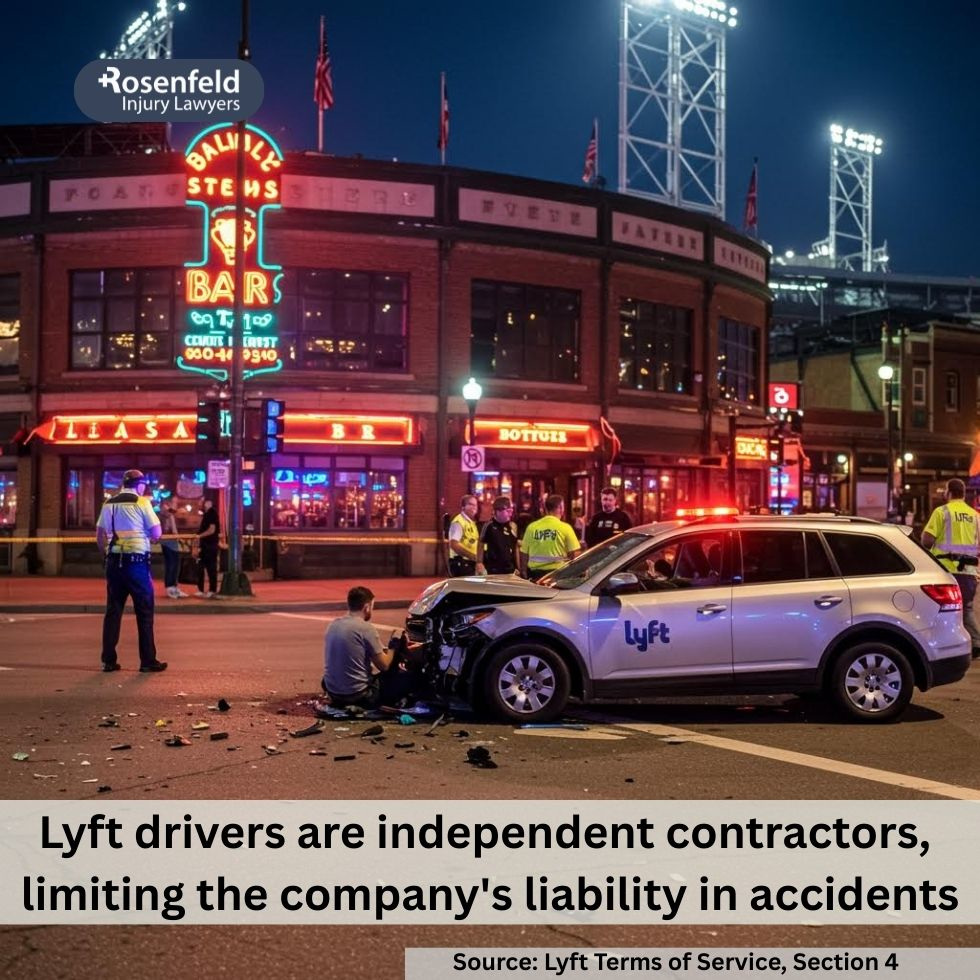
The Role of the Lyft Driver’s Personal Auto Insurance Policy
The driver’s personal car insurance is the first line of defense during Period 0. However, many personal policies exclude commercial or rideshare use unless the driver has a specific endorsement. If the driver lacks this add-on, their insurer may deny the claim entirely.
That’s why Lyft’s coverage becomes vital—especially during Periods 2 and 3, when the company’s $1 million policy is in effect.
What if the Lyft Driver or At-Fault Driver is Uninsured/Underinsured?
If the Lyft driver or another driver at fault lacks adequate insurance, Lyft’s UM/UIM policy may apply—particularly if the accident happened while a passenger was onboard. This can help cover medical expenses, lost income, and pain and suffering when the responsible party doesn’t have enough collision coverage.
In some cases, your own auto insurance may also come into play, especially if you carry strong underinsured motorist coverage.
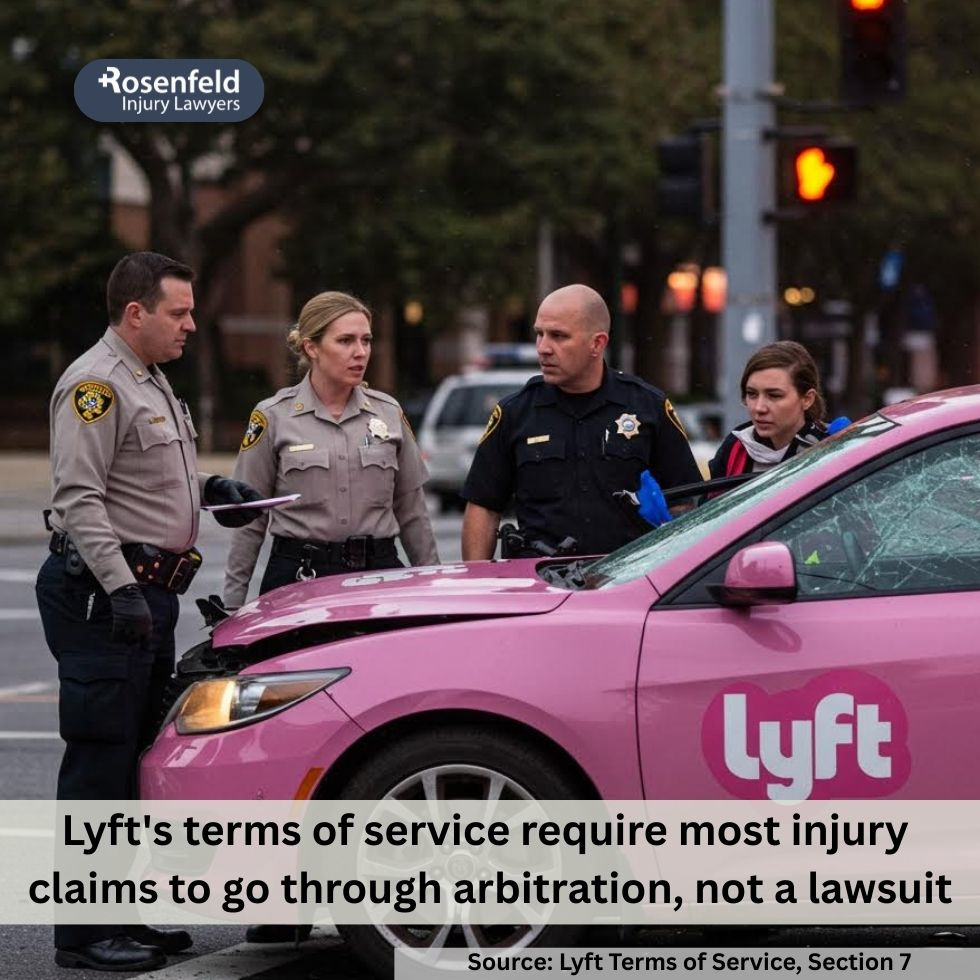
Filing Your Lyft Accident Claim: Insurance First, Lawsuit Maybe
Most Lyft accident cases start with filing an insurance claim against the responsible party—either the Lyft driver, another driver, or Lyft’s own insurer. If negotiations fail or the insurance companies deny responsibility, that’s when you may need to file a lawsuit.
An experienced Lyft accident lawyer can evaluate your legal options and determine the best strategy to recover damages, from filing initial paperwork to litigating in Cook County courts if necessary.
Dealing with Insurance Companies After a Lyft Accident
It’s no secret that insurance companies, including Lyft’s insurance company, work hard to reduce payouts. You might receive a lowball offer, face delays, or have your injuries questioned—especially in cases involving soft tissue injuries or delayed symptoms.
Don’t give a recorded statement or accept a settlement offer without speaking to a Lyft accident lawyer first. These companies have teams of adjusters and attorneys; you deserve someone on your side, too.
Can a Third Party Cause a Lyft Car Accident?
Not every accident is caused by a driver. In some cases, third parties may be to blame—such as:
- A negligent vehicle repair shop
- A defective auto part manufacturer for accidents involving vehicle defects
- A municipality that failed to maintain the roadway
If this is the case, an experienced Lyft accident attorney can investigate and file a personal injury lawsuit against that party.
What Compensation Can You Recover in a Chicago Lyft Accident?
If you were injured in a Lyft accident, you may be eligible to seek compensation for a variety of losses, including:
- Medical expenses (ER visits, rehab, surgery, long-term care)
- Lost wages or diminished future earning capacity
- Damage to your car or belongings
- Pain and suffering, including emotional distress
- Other out-of-pocket costs related to the accident
Common Challenges in Rideshare Accident Cases
These cases can be uniquely difficult. Common obstacles include:
- Determining whether the driver was online in the Lyft app
- Disputes over which insurance coverage applies
- The independent contractor defense shielding Lyft from liability
- Tactics from multiple insurance companies to minimize payouts
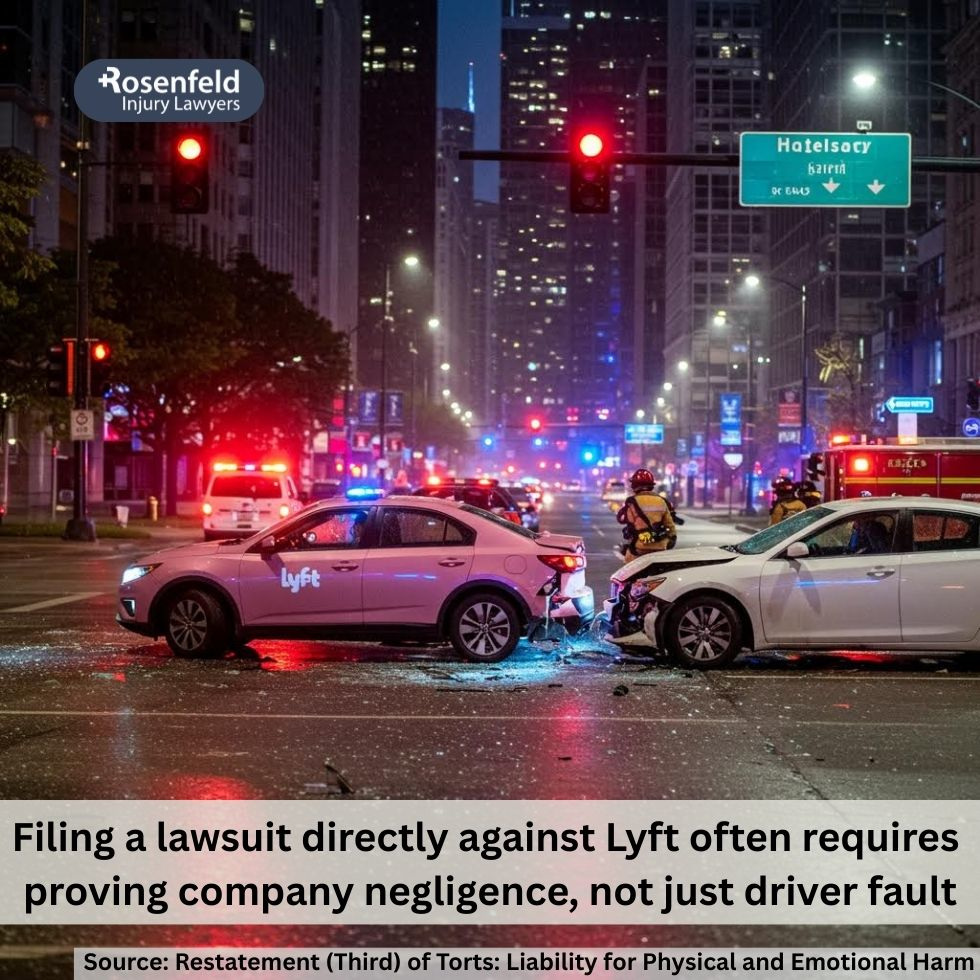
Why Hire a Lyft Accident Attorney in Chicago?
An experienced car accident lawyer in Chicago understands how to overcome these hurdles. At our law firm, we:
- Investigate the accident to determine fault
- Identify all applicable insurance policies
- Handle all communications with insurance companies
- Accurately calculate the value of your damages
- File a lawsuit if insurers refuse to settle
- Fight for a fair settlement
We’re familiar with the tactics used by rideshare companies and their insurers—and we’re not afraid to take your case to court.
How Our Lyft Accident Lawyer Team Can Help You Recover Compensation
At Rosenfeld Injury Law, we’ve handled rideshare accident cases throughout Chicago and Cook County. Our team works directly with crash investigators, medical experts, and insurance specialists to build strong cases for our clients.
Whether you were a Lyft passenger, another driver, or a pedestrian hit by a Lyft vehicle, we’ll help you secure the financial recovery you need for your medical treatment bills, pain, and long-term losses.
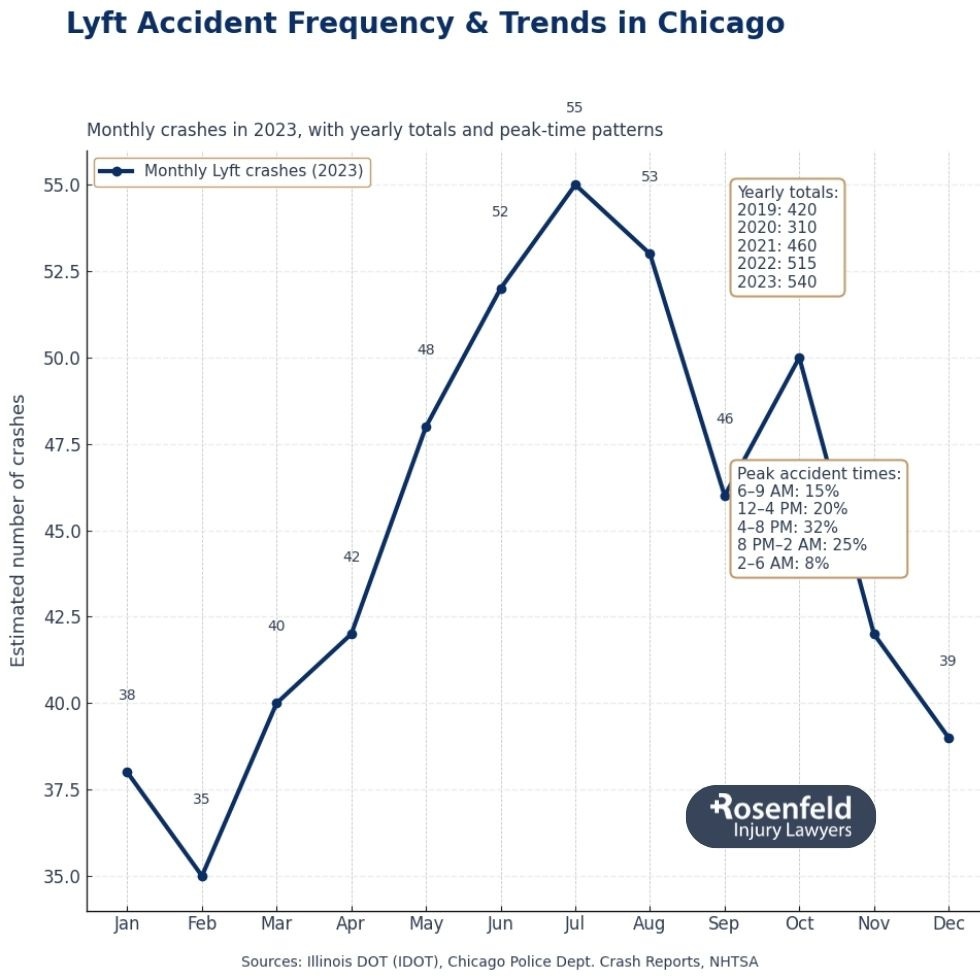
The Illinois Statute of Limitations for Accidents Involving Rideshare Company Vehicles
In Illinois, the statute of limitations for most personal injury claims, including Lyft accident cases, is two years from the date of the accident (735 ILCS 5/13-202). That means you must either settle your claim or file a lawsuit within that time, or risk losing your right to compensation.
There may be exceptions for minors or certain circumstances, but it’s always best to act early.
Contact Our Chicago Law Firm for a Free Consultation Today

If you’ve been injured in a Lyft accident in Chicago, don’t wait to understand your rights. At Rosenfeld Injury Law, we offer a free consultation with no obligation, and we only get paid if you win.
Let our experienced personal injury lawyers in Chicago handle the legal fight while you focus on recovery. Call (888) 424-5757 or fill out our online form to book a free, no-obligation consultation.
All content undergoes thorough legal review by experienced attorneys, including Jonathan Rosenfeld. With 25 years of experience in personal injury law and over 100 years of combined legal expertise within our team, we ensure that every article is legally accurate, compliant, and reflects current legal standards.







